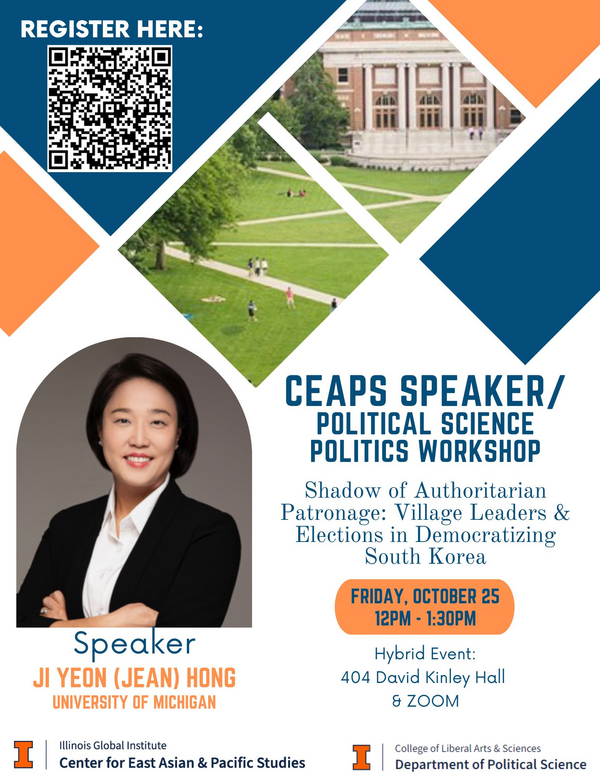
CEAPS Speaker/Political Science Politics Workshop | Ji Yeon (Jean) Hong "Shadow of Authoritarian Patronage: Village Leaders & Elections in Democratizing South Korea"
- Event Type
- Lecture
- Sponsor
- Center for East Asian & Pacific Studies; Co-Host: Department of Political Science
- Location
- 404 David Kinley Hall
- Date
- Oct 25, 2024 12:00 pm
- Registration
- Registration
- Contact
- Alex Chun
- park387@illinois.edu
- Views
- 180
- Originating Calendar
- CEAPS Events Calendar
Join us for a hybrid event with Professor Ji Yeon Hong of Michigan University.
Register at the link above!About the Speaker:
Ji Yeon Hong is an Associate Professor and Korea Foundation Professor of Korean Politics at the University of Michigan. Her research focuses on authoritarian politics and legacies, with particular attention to East Asia, including Korea, China, Taiwan, and Hong Kong. She has various ongoing research projects related to the legacy of the authoritarian past, long-term impact of political violence, and the determinants of government policies under authoritarianism. Her work has been published in American Journal of Political Science, British Journal of Political Science, and Journal of Politics, among others. She obtained a Ph.D. degree from Department of Politics at NYU.Title: Shadow of Authoritarian Patronage: Village Leaders and Elections in Democratizing South Korea
Authors: Ji Yeon Hong (University of Michigan), Sunkyoung Park (Korea University), Hyunjoo Yang (Sogang Universit
Abstract: This paper investigates the enduring influence of authoritarian patronage on voting behavior in South Korea, in both authoritarian and democratic settings. We argue that the persistence of authoritarian patronage depends on the ability of clients to maintain strong trust in the authoritarian successor party. Using original data on village leaders trained under the New Village Movement, a government-led rural development initiative in the 1970s, we show that areas with higher concentrations of these leaders were more likely to support the ruling party in subsequent legislative elections. This pattern held through the authoritarian elections of the 1980s under a new dictatorship. Following South Korea’s transition to democracy in 1987, the influence of patronage initially diminished but later resurged as the authoritarian successor party strategically rebranded itself through a strategic party merger. Nevertheless, as democracy became more consolidated and neoliberal globalization marginalized the agricultural sector, the effect of authoritarian patronage eventually faded. Our findings suggest that the legacy of authoritarian patronage is not merely an outcome of a strong dictatorship but is also significantly influenced by the evolving political and economic environment in a new democracy.